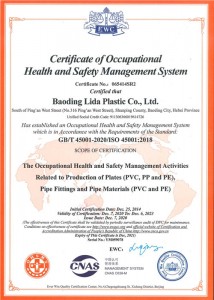nov . 17, 2024 21:53 Back to list
Durable 1% PVC Irrigation Pipe for Efficient Watering Solutions in Agriculture
Understanding 1% PVC Irrigation Pipe A Sustainable Solution for Modern Agriculture
Irrigation is a vital component of modern agriculture, especially as the global demand for food continues to rise. One of the most significant advancements in irrigation technology is the development of PVC (polyvinyl chloride) pipes, particularly those designed for irrigation purposes. Among these, the 1% PVC irrigation pipe stands out as a sustainable and efficient option.
Understanding 1% PVC Irrigation Pipe A Sustainable Solution for Modern Agriculture
The 1% designation refers to the pipe's specific design for low-pressure irrigation systems. Such systems are essential for effective water management, especially in regions where water resources are limited. These pipes are engineered to withstand pressures that are typically encountered in irrigation systems, ensuring durability and longevity. Additionally, the smooth interior surface of PVC pipes facilitates efficient water flow, reducing the risk of clogs and ensuring that crops receive a consistent water supply.
1 pvc irrigation pipe

Another important consideration is the environmental impact of irrigation systems. PVC is known for its durability and resistance to corrosion, which means that PVC pipes can last for decades with minimal maintenance. This longevity is crucial in reducing waste, as the need for frequent replacements is significantly diminished. Moreover, modern manufacturing techniques have made it possible to produce PVC pipes with a lower environmental footprint, aligning with sustainable farming practices.
One of the critical aspects of utilizing 1% PVC irrigation pipes is their ability to conserve water. In many regions, water scarcity is a pressing issue, and efficient irrigation systems can make a substantial difference. By ensuring that water is delivered directly to the plant roots, PVC irrigation systems minimize evaporation and runoff, leading to better water conservation. Farmers can utilize precision irrigation techniques, allowing them to tailor water applications to the specific needs of their crops, which not only conserves water but also enhances crop yield.
Furthermore, the affordability of 1% PVC irrigation pipes makes them accessible to farmers of all scales, from smallholders to large agricultural enterprises. This accessibility promotes more efficient farming practices across different regions, contributing to overall food security.
In conclusion, the 1% PVC irrigation pipe represents a significant advance in agricultural irrigation technology. Its lightweight, durable design, coupled with its water-saving capabilities and cost-effectiveness, make it an attractive option for farmers looking to improve their irrigation systems. As the agricultural sector continues to evolve, the adoption of such sustainable solutions will be crucial in addressing the challenges of food production and environmental conservation. By investing in innovative irrigation practices, farmers can ensure a more sustainable future for agriculture while maximizing their productivity.
-
Durable HDPE Sheet | Versatile & Impact-Resistant Plastic
NewsAug.13,2025
-
Premium PVC Soft Sheets: Clear, Flexible & Durable
NewsAug.12,2025
-
Premium PVC Round Rods: Durable, Chemical Resistant, Easy to Machine
NewsAug.11,2025
-
PP U-channel: Chemical-Resistant, Lightweight & Durable
NewsAug.10,2025
-
Transparent PVC Pipe: Clear Flexible Tubing for Fluids
NewsAug.09,2025
-
Durable PP Rigid Sheet: Versatile & High-Quality Plastic Panels
NewsAug.08,2025

